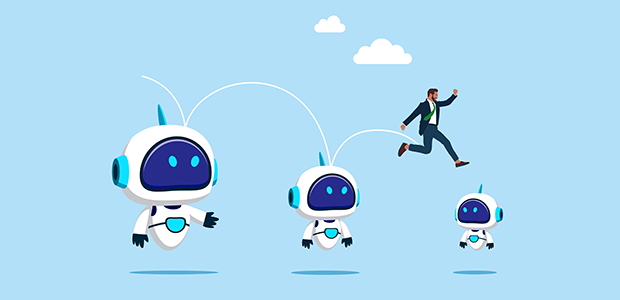
The new rules of work: how to build an AI-proof career
Entry-level jobs are slowly whittling away, as recent grads struggle to get hired in a decreasing number of corporate positions. AI has begun its workforce domination, and young professionals are going to have to adapt to a new way of working – and thinking – in order to stand out.
AI has moved beyond a buzzword for corporate America; across every industry and role, companies have begun integrating AI to improve delivery and drive efficiency.
Nowhere is this shift more visible or more urgent than in entry-level jobs. These roles have long served as the foundation of career progression, opening the door for young professionals to gain experience, build confidence, and develop into leaders. But that foundation is rapidly eroding. What once provided early exposure to business operations is now being automated, streamlined, or eliminated.
Industry leaders are sounding the alarm. Amazon CEO Andy Jassy has acknowledged that AI agents will replace substantial segments of their workforce. LinkedIn’s Chief of Economic Opportunity, Aneesh Raman, has publicly warned that AI poses a threat to the very stepping stones that young people have historically relied on.
While the number of jobs available for young people is decreasing, the market for young workers still exists. What’s changed is how young people can succeed — and how they can stand out.
In today’s AI-accelerated economy, worker value is no longer defined by how well they follow instructions, but by how well they think outside the box. It used to be the case that young workers and interns served as corporate drones, performing rote tasks while they learned the lay of the land.
But these manual, repetitive tasks are now handled by technology – something that requires neither the handholding nor the healthcare that young college grads need. The basic functions of a company can be done by AI: the trick for young job-seekers now is to figure out how to learn those basic functions while also providing value by doing what only humans can do: creating, connecting, strategising, and leading.
AI isn’t taking these jobs – it’s taking the predictable, low-value components of it. The job of the modern worker – especially young job seekers – is to emphasise how they can connect the dots of functions outside of the work being done by AI. Optimising performance and driving strategic outcomes – those are roles that still require human-centred qualities.
CVs today shouldn’t be focused on which coding languages, spreadsheet capabilities, or other more basic paper-pushing activities job seekers have, but rather, those qualities that make them human – and invaluable.
- Creative thinking: while AI can generate outputs, it cannot originate vision. Humans remain the architect and prompt engineers who drive ideas
- Critical judgment: AI lacks the human insight required to navigate nuance. Assessing quality, ethics, and relevance is going to be the role of young people who know the difference
- Tech fluency: while software engineers are being among the hardest hit by AI development, there’s still a role for individuals who are “tech fluent” – able to speak the language of digital tools to know how precisely to use and target them
- Empathic listening: AI can build entire worlds, but those worlds need to reflect fundamental human customer needs. Emotional intelligence is essential
- Proactive initiative: success belongs to those who anticipate challenges and act without waiting for instruction
These traits have always been valuable – but historically they’ve been couched as being the “X” factor that new employees either have or don’t have. But today, they're non-negotiable.
Think of an entry-level marketer. The job used to be a bunch of box clicking: setting up a digital campaign that targets the right audience with the right message at the right time.
But today, AI can set up that campaign in half the time. Using massive data models, AI can predict who the key audience is and what they’re likely to connect with. It reduces time, it reduces cost, and seemingly it reduces the need for human judgement.
But AI can’t make the critical judgement calls of whether this campaign is actually a good idea. AI doesn’t actually understand what a brand’s values are or what they mean. A human, with the right tech fluency, with the creative thinking and critical judgement skills is needed to translate for AI, and in turn, check to make sure the product AI is delivering is correct.
The same applies across HR, operations, finance, and beyond. Every function is being redefined by automation, but only humans can ensure that the outcomes align with purpose, culture, and impact. Young people just starting out in their career need to think bigger than the generations before them, because they’re no longer just executing tasks – they’re curating outcomes. They’re the conductor now; AI is just one instrument in that orchestra.
It’s a shift for workers, one that white collar workers especially are going to have to continually navigate, constantly reassessing the landscape and auditing their skills to make sure they’re maintaining this conductor role. Over the course of the career, staying ahead of AI and the workforce transformation may require a greater dose of humility, taking more lateral moves or even pay cuts to be able to explore new facets of AI technologies.
But this grit is human. Staying hungry and staying humble – and most importantly, staying human – will drive long-term success for employees. The future belongs to those who embrace it.

